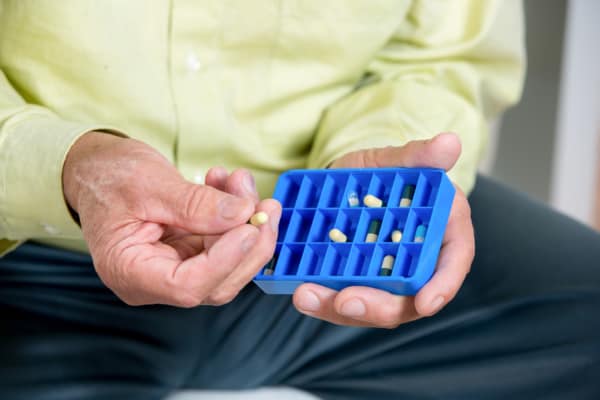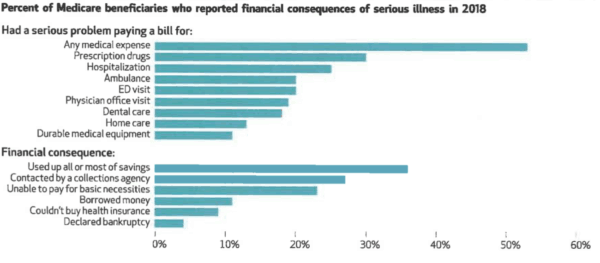
The National Committee has been beating the drum about seniors’ rising health care costs for several years. Now, a new study from Health Affairs confirms that seriously ill seniors face especially daunting financial hardships. According to the study, 53% of seriously ill Medicare patients are experiencing grave difficulty paying their medical bills, with unaffordable prescription drug costs posing the biggest challenge.
“The perception that Medicare works well for most beneficiaries obscures the financial exposure that is concentrated among the seriously ill. High-need Medicare beneficiaries may be especially vulnerable, since patients in the top 5% of spending account for more than half of out-of-pocket spending.” – Health Affairs, November, 2019
The study indicates that these financial burdens are taking a serious toll on seniors and their families. One quarter of respondents said that costs were a “major burden,” and 60% reported that family members and friends had helped out with health care costs “a lot.” When asked which medical costs posed the largest burden, 30% responded “prescription drugs,” second only to “any medical expense.”

Source: Health Affairs
Older Americans have been particularly hard hit at the pharmacy counter in recent years. Prices for the 20 most-prescribed drugs for seniors increased approximately ten times the rate of inflation between 2013-2018. One million Medicare beneficiaries paid nearly $3,200 in out-of-pocket drug costs in 2016. Increased cost sharing for prescription drugs has forced seniors to forgo needed medications, cut pills, and skip doses – or choose between medicine and groceries.
The National Committee is in the midst of a campaign to reduce seniors’ prescription drug costs, entitled “Don’t Cut Pills, Cut Profits.” The campaign includes town halls in select American cities. The first one took place in Milwaukee in October; the second happens Friday in Portland, Oregon. A third town hall will take place in Lansing, Michigan on December 9th. At each town hall, local seniors have the opportunity to dialogue with elected leaders, in order to become educated and empowered to lower prescription prices.
Attendees of these town halls have shared heartbreaking stories about soaring drug costs.
“The inhalers for my lung cancer cost $200 a month. We pay $270 a month for Medicare. My husband cuts his pills.”
“A medicine that helps me with chronic pain is unaffordable. It’s only $170 a month, but on a Social Security income, I can’t pay for it.”
“My medication costs put a major strain on my monthly Social Security checks.”
Crushing medical costs have negative consequences for seniors’ physical and financial health, according to the new study. More than one third of respondents said they had exhausted “all or most” of their savings to pay medical bills. Twenty-seven percent indicated they had been contacted by a collection agency. Nearly one-quarter of the seniors surveyed said they were not able to pay for essentials such as food, utility bills, and housing.
To mitigate the financial strain on seniors, the National Committee advocates catastrophic caps on out-of-pocket costs for Medicare Part B and Part D beneficiaries, improved supplemental Medigap coverage, and the passage of legislation to allow Medicare to negotiate drug prices with Big Pharma, which would produce some $345 billion in cost savings over seven years. These represent reasonable, common sense solutions to stop seniors from going broke because of soaring health care costs in the world’s wealthiest nation.


